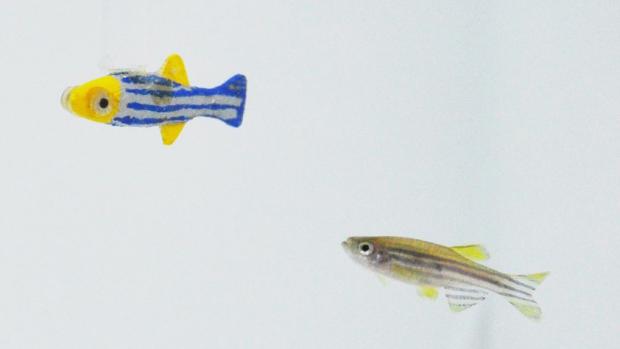Researchers at NYU Tandon Find Zebrafish Want to Hang Out With Moving 3D Robotic Models of Themselves

Authenticity is an important trait, and zebrafish take it especially seriously. An interdisciplinary team of researchers at the NYU Tandon School of Engineering discovered that zebrafish engage more with 3D-moving robotic models of themselves than with other stimuli.
The team, headed by Maurizio Porfiri, professor of Mechanical and Aerospace Engineering, devised the controllable, customizable robotic platform to help researchers more accurately study freshwater fish behavior. Like a puppet master, the robotic platform maneuvers biologically inspired 3D-printed replicas to mimic the swimming patterns of real fish.
Zebrafish are highly versatile and increasingly taking the place of more complex animals in behavioral studies. Understanding their social behavior may help researchers explore mechanisms behind human disorders like anxiety, addiction, autism, and schizophrenia.
For this test, Porfiri and his team introduced the live zebrafish in the middle section of a three-compartment experimental tank with the robotic fish and an empty section on either side. The researchers contrasted the response of live fish to the 3D-moving replica, a 2D-moving replica, a static replica, a transparent replica, and a non-moving rod.
Their findings showed that fish were attracted to a robot that mimicked both the appearance and the motion of real fish, and this attraction was lost when either differed.
“The fish, when presented with the choice between a static robot and one that was moving in 3D and beating its tail, preferred to spend time with the latter. This clarifies the important role motion plays in influencing zebrafish behavior,” said Porfiri. “These experiments also significantly refined the robotic platform that enables consistent, repeatable tests with our live subjects.”
The research team includes NYU Tandon researchers Tommaso Ruberto and Daniele Neri, doctoral student Violet Mwaffo, and undergraduate student Sukhgewanpreet Singh.
The National Science Foundation and the Mitsui USA Foundation supported the research. “Zebrafish Response to a Robotic Replica in Three Dimensions,” appeared in Royal Society Open Science and is available at rsos.royalsocietypublishing.org/content/3/10/160505.
Note: Images available at http://dam.poly.edu/?c=1834&k=bed988ac5d
About the NYU Tandon School of Engineering
The NYU Tandon School of Engineering dates to 1854, when the New York University School of Civil Engineering and Architecture as well as the Brooklyn Collegiate and Polytechnic Institute (widely known as Brooklyn Poly) were founded. Their successor institutions merged in January 2014 to create a comprehensive school of education and research in engineering and applied sciences, rooted in a tradition of invention, and entrepreneurship and dedicated to furthering technology in service to society. In addition to its main location in Brooklyn, NYU Tandon collaborates with other schools within the country’s largest private research university and is closely connected to engineering programs in NYU Abu Dhabi and NYU Shanghai. It operates business incubators in downtown Manhattan and Brooklyn and an award-winning online graduate program.




